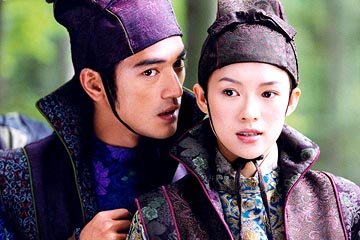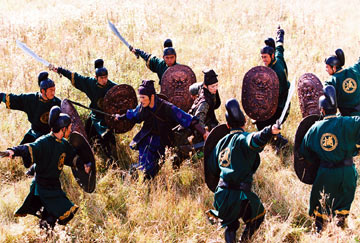

It's turning out to be a great year for historical Chinese epics. First Hero, then Warriors of Heaven and Earth, and now House of Flying Daggers. It almost feels silly gushing about Zhang Yimou's talents, but if he keeps outdoing himself like he does here, then all the more reason to fawn. House of Flying Daggers is simply astounding. Zhang takes the narrative elements that were missing in Hero, combines them again with lush production value and spectacular martial arts, to produce a film that is equal parts drama and action movie, and extremely satisfying on both counts. This film takes place in 859 AD, in the waning years of the Tang Dynasty. In a rural area, authorities are fighting against a Robin Hood-like gang known as the Flying Daggers, known for their precision ability with throwing knives. Officials have killed the leader, and are trying to find his replacement.
Local captains Jin (Takeshi Kaneshiro, Turn Left, Turn Right, Lavender) and Leo (Andy Lau, Running on Karma, Give Me A Chance) become suspicious when they learn there is a new blind woman at the local Peony Pavilion (brothel). There is a rumor that the deceased leader of the Flying Daggers had a blind daughter, and they go to investigate. Mei's (Zhang Ziyi, Hero, Crouching Tiger, Hidden Dragon) abilities clearly indicate something unusual, and they incarcerate her. Leo and Jin plot to break her out of prison, hoping she will lead them to the Daggers. Since she is blind, she doesn't know Jin's identity as a policeman, so he is to accompany her. Jin is a ladies man, so flirting with Mei to increase her trust in him is a given. What he does not expect is to slowly fall in love with her.
The Asian title of this film is Lovers. It just goes to show how the naming of a film can attract different audiences. This is a martial arts film, but it is so much more than that. Zhang (Hero, Happy Times) and co-writers Li Feng and Wang Bin (Hero) place the focus squarely on the characters. Jin's newfound affection for Mei is conflicting with his mission. She is a fugitive and he is a law enforcement official. Mei does not know whether she can trust Jin. He is obviously a player, and she has no desire for games. Zhang, Li, and Wang do throw in a late second act revelation about one of the characters that expands the emotional turmoil of the narrative and places some ambiguity on the Asian title of the film. It's a standard plot device in Asian films, but may be a little much for Western viewers. Still, there are many layers to each of the characters. Of the three main characters, each is hiding at least one secret from both of the others. Revealing these secrets leads to confrontations, including the climactic bloody showdown in a snowy field.
Above all, House of Flying Daggers is visual eye candy. Instead of focusing on one color at a time like he did in Hero, Zhang unleashes the full spectrum upon an unsuspecting audience. The settings and elaborate costumes are beautifully rendered, vibrantly bursting with color. The Peony Pavilion in particular is a marvelous set, resplendent with detail. Once Jin and Mei escape into the forest and beyond, the natural settings take over. They run through a forest, grassy meadows, and later a fog enshrouded bamboo forest. Zhang's camera tracks knives Matrix-style as they leave the hand of the thrower, spin through the air and slam into their targets. The flying knives serve to represent the movie as a whole. They look so beautiful as they glide through the air, yet this beauty masks their inherent deadliness.
The martial arts are also a step above Hero, where they seemed more metaphysical. The same beauty and grace are here, but these are not professional assassins. The people here are criminals, policeman, and soldiers willing to get down and dirty. There are three stand out scenes in Flying Daggers, each one different from the other. The first occurs early in the film, where Leo challenges Mei's abilities as a dancer. Zhang combines martial arts with dance in a graceful sequence that is both stunning and dangerous. The other highlights are a fight high atop a bamboo forest, with people cutting shoots from underneath each other and throwing them, and an unfairly matched battle in a field, where Mei and Jin battle dozens of sword-wielding soldiers.
Zhang wisely balances the action and drama. He is a dramatic director first, and has a lot of experience coaxing good performances out of his actors. Most of Asian cinema is oriented towards action, and acting is not a high priority. Here, Zhang, Lau, and Kaneshiro allow the audience to relate to them. They emote simple things like love, jealousy, and anger, emotions everybody can understand, so when the actors fly through the air, it does not seem as far-fetched, but not as much as they did in Hero or Crouching Tiger. He is restraining himself, opting for a little more realism (okay, not much more), effectively grounding the story more. Nevertheless, it is the masterful way in which Zhang mixes dazzling martial arts with heady emotions that makes House of Flying Daggers such a great movie to watch.